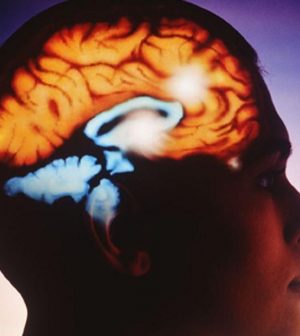- 10 Strategies to Overcome Insomnia
- Could Artificial Sweeteners Be Aging the Brain Faster?
- Techniques for Soothing Your Nervous System
- Does the Water in Your House Smell Funny? Here’s Why
- Can a Daily Dose of Apple Cider Vinegar Actually Aid Weight Loss?
- 6 Health Beverages That Can Actually Spike Your Blood Sugar
- Treatment Options for Social Anxiety Disorder
- Understanding the Connection Between Anxiety and Depression
- How Daily Prunes Can Influence Cholesterol and Inflammation
- When to Take B12 for Better Absorption and Energy
Scientists Find Clue to Links Between Autism, Epilepsy

Kids with autism have low levels of a protein that quiets overactive brain cells, which may explain why so many have epilepsy, according to a new study.
Because the protein can be detected in cerebrospinal fluid, it may have promise as a marker to diagnose autism and as a potential treatment target for the epilepsy that sometimes accompanies it, according to Northwestern University researchers.
The protein pinpointed in this study — called CNTNAP2, or “catnap2” — is produced by the brain cells when they become overactive. Because the brains of kids with autism and epilepsy don’t have enough of it, their brains don’t calm down, which leads to seizures, the study authors explained.
“We can replace CNTNAP2,” said lead study author Peter Penzes, director of the Center for Autism and Neurodevelopment at Northwestern’s Feinberg School of Medicine, in Chicago. “We can make it in a test tube and should be able [to] inject it into children’s spinal fluid, which will go back into their brain.”
For the study, the researchers analyzed cerebrospinal fluid from people with autism and epilepsy, and from mice. Levels of the protein in cerebrospinal fluid help determine levels in the brain.
The findings, published online Dec. 17 in the journal Neuron, could lead to new treatments, the study authors suggested in a university news release.
Penzes and his team are now conducting preclinical research on the injection technique.
While cerebrospinal fluid from patients with Alzheimer’s and Parkinson’s has been analyzed to help diagnose disease and assess response to treatment, the researchers said this is the first such study in people with autism.
In the United States, autism affects one in 58 children, and 30% to 50% of them also have epilepsy.
More information
The Autism Research Institute has more on autism and seizures.
SOURCE: Northwestern University, news release, Dec. 17, 2021
Source: HealthDay
Copyright © 2026 HealthDay. All rights reserved.










